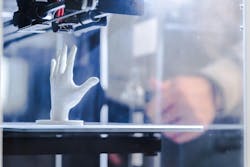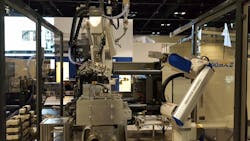On-Demand Manufacturing: Giving Customers What They Want
"Consumers are increasingly dictating what they want, when [they want it], and where they want it," states Deloitte’s report Made-to-order: The rise of mass personalization.
Manufacturers are increasingly turning to on-demand manufacturing to satisfy these demands with reduced cost-per-part and faster times to market.
Take, for instance, Fictiv’s 2021 State of Manufacturing Report which interviewed senior decision-makers at companies that produce medical devices, robotics, automotive, aerospace, or consumer electronics. Of the 230 surveyed participants—who worked in the supply chain, engineering, research & development, technology, or business leadership roles—84% said they had already used on-demand manufacturing platforms. 100% said they had benefited from them, with more than 60% citing manufacturing quality, transparency, and speed as being among the improved factors.
But what is on-demand manufacturing?
First, let’s look at why it is distinct from traditional manufacturing—which on-demand is positioned to replace.
Traditional manufacturing systems are based on the requirements of large-scale production that, typically, involve significant lead times with storage and shipping. Traditional manufacturing models generally rely on high minimum quantity orders, to be cost-effective. The issue here is these models constrain product designs and make it relatively impossible for customers to request a custom product.
This is where on-demand manufacturing comes into play, helping manufacturers deliver precisely what customers want in terms of quantities and design specifications, from the prototype stage through to the last-stage delivery.
Market Conditions
On-demand platforms rely on cloud-based software, making it easy for companies to get instant quotes, track inventories and orders through any browser, and manage projects around the clock. With on-demand manufacturing, only the quantity of ordered goods is produced.
Advantages of on-demand manufacturing include reduced cost-per-part, accelerated times to market, and producing products according to market conditions.
On-demand manufacturing, like mass customization, relies on new technologies. As written in Deloitte’s report: “Flexible manufacturing and 3D printing enable mass personalization at lower costs and allow manufacturers to rethink their supply chains radically.”
Other key areas include the use of CNC machines to increase manufacturing speed and accuracy, sheet metal fabrication to support customization, and automation for processes like injection molding.
Injection molding might be talked about less than technologies like 3D printing, but it's just as important to on-demand manufacturing; Injection molding can handle the highest variety of materials in terms of quantity, colors, cosmetics, surface textures, and polishes compared with 3D printing or CNC machining.
Automation has long been used to handle the most repetitive aspects of injection molding applications. This includes the loading and unloading of parts, trimming, pick-and-place, and parts assembly—for which industrial robots are crucial. However, companies often approach TM Robotics having previously struggled to find a suitable robot to collaborate with their injection molding equipment.
The Right Robot
In many cases, end users have opted for Cartesian X-Y gantry-style robots. But other options are available and better suited to on-demand manufacturing.
TM Robotics, the premier partner of Shibaura Machine—formerly known as Toshiba Machine—offers a greater variety of robots. That includes 6-axis robots with large payloads or ceiling-mounted SCARAs for those with much more compact work areas. Recent installations have included the Shibaura Machine TVM 6-axis range, a vertically articulated robot series that is available in three different sizes, with up to a 44 lb. (20 kg) payload.
These robots also integrate easily with injection molding machines. As with Shibaura Machine’s robots, the brand’s injection molding machinery is developed by expert engineers in Japan. The range of machines features enhanced versatility and performance and streamlined design, providing significantly faster injection speeds than traditional molding equipment.
Increased Throughput
Among the newest equipment is the SXIII range of injection molding machines. The all-electric range is an enhanced performance model that provides significantly faster injection speeds than traditional molding equipment. Available in 17 different injection capacities and dimensions, the series is ideal for virtually any molding application, including automotive, aerospace, packaging, and medical. When paired with a fast cycle 6-axis robot for loading and unloading, manufacturers can expect increased throughput.
And there is the newest TVM range of highly productive, reliable robots aimed at a multitude of industries, including automotive components, medical, packaging, and pharmaceutical―and plastics.
The largest, the TVM1500, provides a maximum reach of 67.5 in. (1,715 mm), the TVM1200 can reach up to 56 in. (1,418 mm), and the smallest model, the TVM900, provides a maximum reach of up to 44 in. (1,124 mm). In addition to three distinctive arm lengths, the operating range of each model can be expanded by mounting the robot on an optional linear actuator.
The combination of injection molding machines and suitable robots is a considerable help to customers wanting to invest in a complete injection molding solution. In all cases, the machines are designed for enhanced versatility and performance and can support significantly faster loading and unloading speeds for molding applications.
With these combined factors, manufacturers can be equipped to take on the demands of mass personalization and on-demand manufacturing.
Nigel Smith is the CEO of TM Robotics, a Shibaura Machine partner.
About the Author
Nigel Smith
CEO - TM Robotics
Nigel Smith is the CEO of TM Robotics, a supplier of industrial robots. For advice on calculating robot ROI, or deciding on the correct robot for your application, you can call or e-mail using the contact information above.


